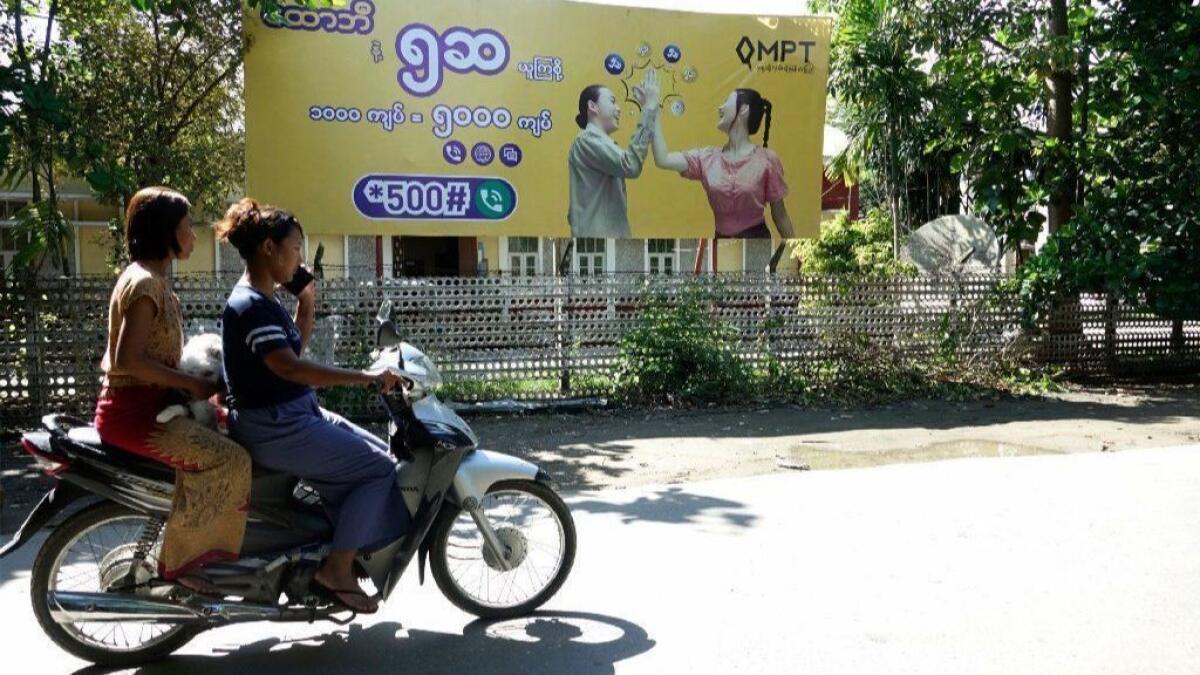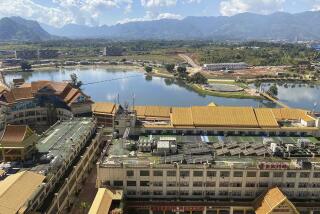Back Story: An increasingly popular authoritarian tool: Shutting down the internet

- Share via
Reporting from Singapore — For civilians in Myanmar’s Rakhine state — who have survived army-led massacres, violence by ethnic militias, restrictions on humanitarian aid and the forced displacement of hundreds of thousands of neighbors — life just got more difficult.
The Myanmar government last week suspended cellphone internet service in eight townships in Rakhine and one in neighboring Chin state where the army is battling insurgents. Government officials cited “rule of law and public safety concerns,” arguing that armed groups were coordinating their activities online.
The temporary ban, which went into effect June 21 with no sign of when it would be lifted, is the latest example of how authoritarian governments are increasingly shutting down or disrupting internet service in times of instability.
From 2016 through 2018, the digital rights advocacy group Access Now documented 371 instances worldwide in which authorities restricted internet service or mobile apps, with more than half the cases occurring in 2018.
The vast majority of shutdowns — 310 — occurred in Asia, home to emerging economies with large numbers of new internet users and where the free flow of information often poses a direct challenge to authoritarian governments.
China remains the model for internet censorship and surveillance, but India, which bills itself as the world’s largest democracy, has been the quickest to cut off internet service.
According to one local watchdog, India imposed 56 internet suspensions already this year, often in the disputed northern territory of Kashmir, where security forces have used harsh tactics to quell a long-running separatist movement.
This year, social media was temporarily blocked in Sri Lanka following the deadly Easter bombings and in Indonesia during unrest following April’s presidential election. Sudan’s military rulers this month attempted to quash massive demonstrations by blacking out almost all internet and phone service, and sending paramilitary groups to violently break up protests.
In Myanmar, where the overwhelming majority of people access the internet on their phones, the nine townships where mobile data service was interrupted had a combined population of about 1 million people in 2014, when the country’s last census was conducted. No one knows for sure how many live there now. Huge numbers of civilians fled Rakhine after the army launched a devastating crackdown against Rohingya Muslim civilians beginning in 2017.
Tens of thousands more have left their homes in recent months to escape a new round of violence — this time between the army and a Rakhine Buddhist militant group known as the Arakan Army. The group, which backed government forces against the Rohingya but is now demanding greater autonomy for the country’s poorest state, reportedly recruits civilians and is believed to number several thousand fighters.
“The conflict in the Rakhine is serious and this [internet shutdown] advantages the military in their response against the Arakan Army,” said Bridget Welsh, associate professor of political science at John Cabot University in Rome.
All sides of Myanmar’s kaleidoscope of ethnic divisions use the internet to push their agendas, and Facebook in particular has been pilloried for failing to block content that feeds the violence. The social media giant has since banned senior members of the Myanmar military and several armed groups it deemed “dangerous,” including the Arakan Army.
Protecting public security is the main reason cited by governments world to justify clamping down on the internet, said Mai Truong, a research director at the New York-based advocacy group Freedom House.
Another is to stem the flow of misinformation, particularly during periods of social or political unrest. (Several East Asian countries have also passed or are considering laws that criminalize social media posts that governments find false or damaging.)
“This trend is growing in part because governments are learning from each other,” Truong said. “When one government shuts down the internet with little consequence, it lowers the opportunity cost for other governments to follow suit when the desire arises.”
But experts say there are real costs to such shutdowns, even if they only last a short time.
A 2016 study by the Brookings Institution calculated that 81 temporary shutdowns over 12 months caused at least $2.4 billion in lost economic activity. More recently, a study funded by Facebook found that disrupting internet access for one day in a country with medium-level connectivity produces a loss of 1% of the country’s daily economic output.
“Network shutdowns likely do more harm than good, cutting citizens off from the ability to communicate critical information with one another and seek services in times of need,” Truong said.
When service is disrupted in conflict regions, the actions can worsen the toll on communities caught up in fighting.
Yanghee Lee, the United Nations’ special rapporteur on human rights in Myanmar, warned this week that the Myanmar armed forces — which have escaped accountability for atrocities against the Rohingya — were engaged in “clearance operations” in Rakhine that in the past have been “a cover for committing gross human rights violations.”
“I fear for all civilians there, cut off and without the necessary means to communicate with people inside and outside the area,” Lee said.
In Sittwe, the capital of Rakhine, Rohingya Muslims who have been forced to live in open-air internment camps since 2012 said they have lost contact with relatives who remain in the northern townships. While phone calls and text messages have not been blocked, coverage is spotty, and most people rely on internet-based messaging apps to communicate.
“It is very hard to reach people on the phone now,” Saed Arkani, a Rohingya community leader, said by phone from Sittwe. “You can’t hear the voice clearly, or the call doesn’t go through. People are worried about what is happening there because we have no way of communicating, and we know fighting is going on.”
By most accounts, this is the first time Myanmar, formerly known as Burma, has imposed such a ban since a civilian-led government was elected in 2015, ending a half-century of army rule.
The internet was relatively slow to arrive in what was long one of the world’s most closed-off societies. In 2007, when soldiers crushed a peaceful uprising of Buddhist monks dubbed the Saffron Revolution, some citizen activists went online to share photos and video of the violence — prompting the government to pull the plug on the country’s internet connection for two weeks.
Myanmar has since relaxed government control of cyberspace and opened the door to foreign telecommunications companies, including Norway-based Telenor, which controls about one-third of the market of more than 50 million people.
The company issued a statement saying it had asked the government for “further clarification” on the reasons for the shutdown and argued that “freedom of expression through access to telecoms services should be maintained for humanitarian purposes.”
But that was as far as the company — which depends on government approval to operate in Myanmar — could go.
“The military has considerable clout,” Welsh said, “and on the issues of security, especially in the contentious Rakhine, the reality is that they can still call these matters.”
More to Read
Sign up for Essential California
The most important California stories and recommendations in your inbox every morning.
You may occasionally receive promotional content from the Los Angeles Times.











